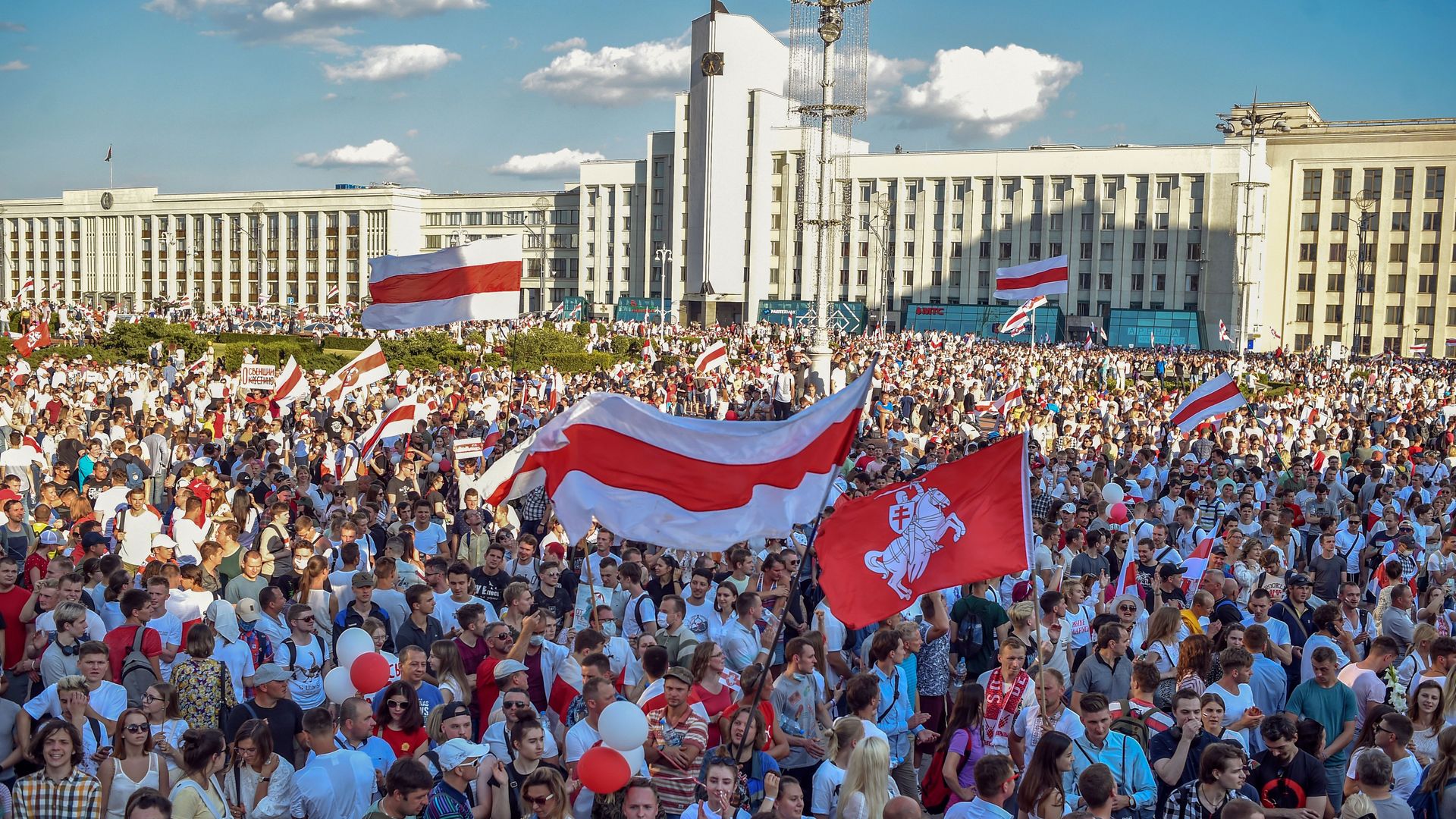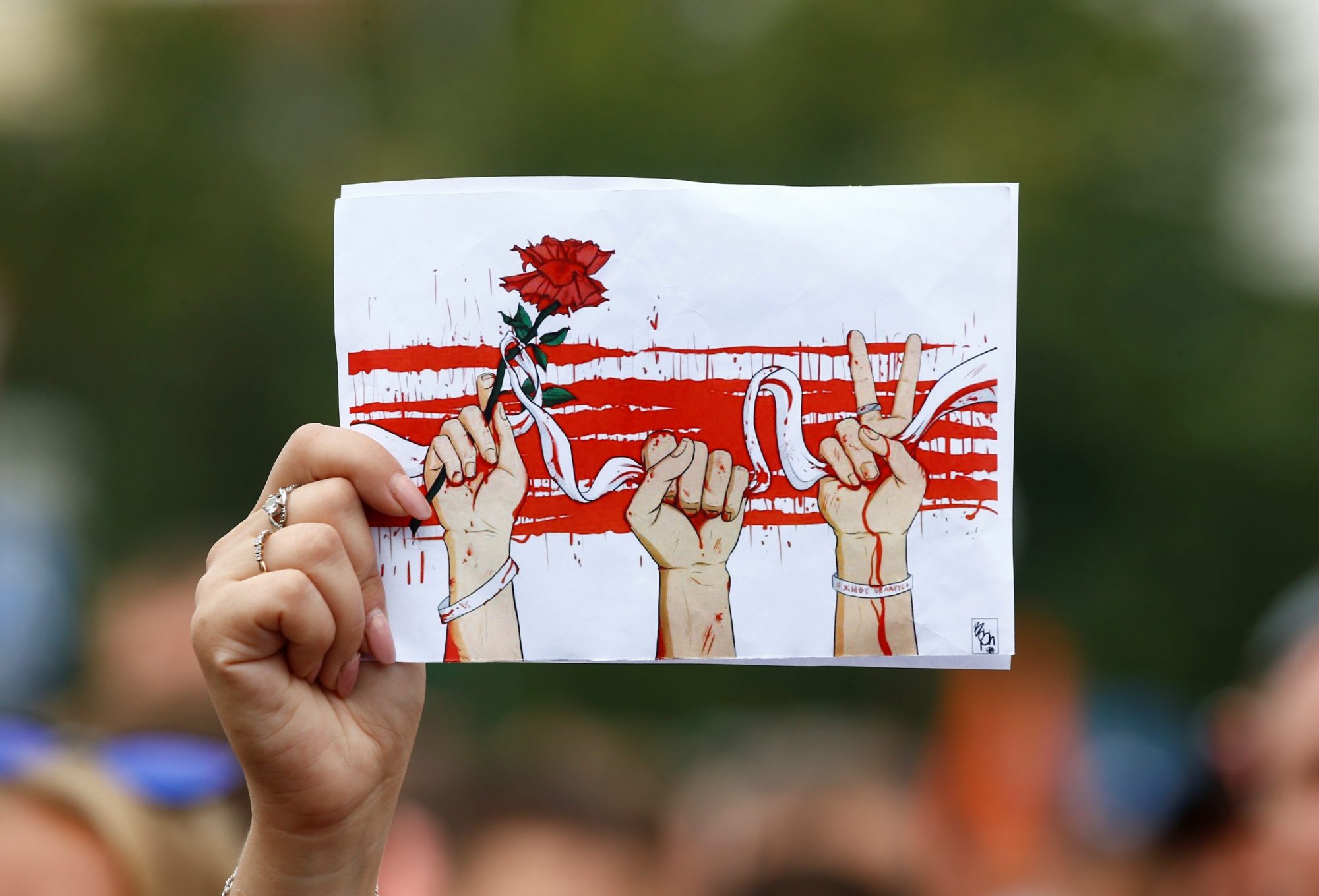
The harsh threats from Alexandr Lukashenko have not intimidated the Belarusian public. Hundreds of thousands of people have marched this Sunday, defeating fear, through the streets of Minsk and other cities in the country to demand the resignation of the leader and the repetition of the elections.
They are demanding, defiantly, democracy in the strategic country of Eastern Europe, which has been experiencing the largest mobilisations in history for two weeks. The government’s show of force, which has warned that it will once again quell the protests and which has deployed thousands of soldiers on the streets of the capital this Sunday, has not frightened an immense tide of citizens that, despite the brutal repression, maintains the pressure about the man who has run the country for 26 years.
Neither the rain nor the uniformed men were strewn along the avenues that gave the city of Minsk a sinister appearance have discouraged citizens. Wrapped in the traditional Belarusian flag —white with a red stripe, used before the Russian Revolution and after the fall of the USSR, which has become an emblem of the opposition, carrying banners against the Belarusian leader, citizens condemned the regime to give up power. “Go!”, “We believe, we can, we will win!”, “Lukashenko to the police van!”, they chanted.
 Lukashenko, 65, who has insisted that the protesters are “puppets of the West”, has redoubled his threats. “They have the weekend to think,” he advanced at a rally in the city of Grodno on Saturday night, near the border with Poland, where he has deployed troops ready for combat. “As of Monday, do not regret it,” he added.
Lukashenko, 65, who has insisted that the protesters are “puppets of the West”, has redoubled his threats. “They have the weekend to think,” he advanced at a rally in the city of Grodno on Saturday night, near the border with Poland, where he has deployed troops ready for combat. “As of Monday, do not regret it,” he added.
The Belarusian leader, who despite the serious evidence of manipulation of the electoral results of August 9, claims as clean the elections that give him his sixth term, has re-enacted Sunday afternoon that his pulse will not tremble when he has landed by helicopter in the Palace of Independence, his official residence, dressed in black, with a bulletproof vest and carrying an assault rifle. Thousands of peaceful protesters congregated nearby.
“I voted for him years ago but it just shows he’s out of date. If he was gone 10 years, five years ago, he could still save his legacy. Now his hands are even more stained with blood, ”says 63-year-old retired teacher Daria Shimanovich. She says that her granddaughter was arrested during the first days of protests when the riot police were used to full force to contain public anger after the official announcement that Lukashenko had won the elections by 80% of the votes compared to 10% for Svetlana Tijanóvskaya, her main rival and the woman who has unified the opposition.
In Minsk, where some two million inhabitants live, some 100,000 people came out to protest, according to calculations by the Interfax agency; 200,000, according to the opposition. Mobilisations in a country where, until just a few months ago, the public had great qualms about talking about politics. And the protests were replicated, at scale, in smaller cities.
“Today is a historic day. We show that despite everything we do not give up, that we stand up for our country ”, says Dmitri Matusevich, 40 years old. Matusevich, a worker, believes that the key that would make the difference is the strike in state-owned companies, which, however, after Lukashenko’s threats that he would close down any company with work stoppages, has declined. This Sunday, thousands of workers from the Minsk factories joined the protest, but it is one thing to march and another to stop working and being targeted, some commented.
Lukashenko is more and more castled and despite the mobilisations and initiatives of the civic movement that is giving body to the opposition, the majority of Belarusians are increasingly aware that peaceful protests may not be enough to oust the leader from power. The former director of a Soviet kolkhoz (collective farm) who in his youth formed the Communists for Democracy faction within the party, has called the protesters “rats” and “garbage.”
He assures that the opposition is managed by the West and paid by NATO and that in addition to seeking to overthrow it they intend to move the country away from the sphere of Russia, its traditional ally. With this argument, Lukashenko tries to resemble the mobilisations in Belarus with what happened in Ukraine in 2014, when the pro-European and anti-corruption demonstrations evicted President Victor Yanukovych, an ally of the Kremlin.
But reality shows that what happens this summer in the former Soviet republic has nothing to do with it: it is not a pro-European mobilization, simply Belarusian. And in a country where dissidents are in prison or exiles and there is no experienced opposition to Lukashenko, the lack of structures also sets the tone.
No EU flags
In the demonstrations in Belarus, no EU flags have been seen, on one occasion at the beginning of the mobilisations two citizens displayed one in the centre of Minsk and the rest of the participants in the march demanded that they keep it. “We are not asking to join NATO or the EU or anything like that. I do not know if because it is too simple Lukashenko does not get the message, but what we want is for him to leave, to be able to elect our president democratically”, Mikola Kotovich sums up.
This Sunday, in fact, some protesters were carrying Russian flags to show that the Belarusian leader is not right and that this is not about Moscow. But the regime tries to turn the mobilisations for democracy in Belarus into a question of identity or language, and polarize a society that is not. There is not a majority of Belarusians who want a union with Russia, but they do feel ties with the neighbouring country. “This has never been about Russia or the West.
All this information that we are Nazis, that we want a bad relationship with Russia is so false that it is embarrassing. If instead of spreading these things they would dedicate themselves to doing their job”, suggests the diplomat Pavel Latushko, one of the visible faces of the transition committee that the opposition has formed to try to dialogue with the Government and that demands new elections and the release of political prisoners. “We are totally out of the discussion on international politics,” he says.

In this argument, there is also the traditional red-and-white Belarusian flag, emblem of the National Republic of Belarus in 1918. The coat of arms was waved again in 1991, with the collapse of the Soviet Union, but it was again replaced by an adaptation of the old Soviet flag. (without the hammer and sickle) when Lukashenko came to power in 1994 and held a referendum on that symbol.
Since then, Lukashenko’s supporters have pointed to the red-white flag for its use by Belarusian collaborators with the Nazis; although it is much earlier. The State Administrations and state television, which since the wave of resignations of Belarusian journalists due to the repression now operate Russian propagandists and technicians, thus disseminate constant information that associates the traditional Belarusian flag with Nazism; They have also assured that the opposition intends to build a wall between Russia and Belarus.
And this Sunday, Defense Minister Víktor Jrenin reprimanded protesters for carrying the flag near the symbolic monuments of World War II. “We cannot calmly watch how people go to these holy places to hold protests under the same flags under which the fascists organized the murders of Belarusians, Russians, Jews and others,” said Jrenin. “We cannot allow it. I categorically warn you that if order and calm are disturbed in these places, it will not be dealing with the police, but with the Army”, he said.
Need for dialogue
While the international community insists Lukashenko on the need for dialogue, the Belarusian leader remains closed in on the band. Last week he appealed to the Kremlin for help, from which he had distanced himself and even accused of a plot, and since then he seems to have caught his breath. Russia, which has shown its support for Belarus, seems to be heeling in recent days somewhat more towards concrete support for Lukashenko that it has not yet announced. Analysts warn that it is still too early to determine whether and when Moscow will help the Belarusian leader hold on or bet on a replacement.
This Sunday, Russian Foreign Minister Sergey Lavrov, who had pointed out that the presidential elections on August 9 were not “ideal”, stressed that there is no way to prove that Lukashenko did not win the presidential elections because there were no observers on the ground. international The Organization for Cooperation and Security in Europe (OSCE), which has not considered the elections of previous legislatures as fair, did not send observers on the ground this year; They emphasise that Lukashenko did not extend the invitation on time. Lavrov also accused opposition leaders of wanting a “bloodshed” in Belarus.
 Future Scenarios in Belarus
Future Scenarios in Belarus
In the volatile situation in Belarus, the scenarios for the future are diverse. The most desirable for the opposition is that the transition council be consolidated or transformed into a citizen body that negotiates with the authorities a mechanism for exiting the crisis; the condition would be the departure of Lukashenko, points out the political scientist Pavel Úsov, of the Belarusian centre for European studies. However, the Belarusian leader does not seem at all inclined to this option.
After Lukashenko’s constant threats, another scenario could be outlined in which the authorities decree a state of alarm and send troops to the cities, Úsov deepens. But that option has its risk, that the uniformed men do not support the Government. “The most negative scenario is the participation of Russia, which undoubtedly has an important key if not to say key.
If Moscow supports the regime, it will become an aggressor and may provoke anti-Russian sentiments; that can put an end to Russia’s future plans to keep Belarus in its orbit of influence, ”says the political scientist, who however does not believe that this is Moscow’s option. “Russia has not taken a univocal position. But it also resists any hint to involve the West or other actors in the game or in the dialogue. The Kremlin is more in observation mode than in participation”, says analyst Artyom Shraibman, from the Sense Analytics think tank.
Moscow can then choose a “more manipulative” scenario, Usov says. “As soon as Russia decides that Lukashenko can no longer remain in power and that his political life is a matter of hours, it can step in and take the side of the winner, that of the opposition or that of the Belarusian people. He would have carte blanche to carry out his plans in Belarus: an interim government, or an opposition figure or new elections. Russia, as ‘saviour country’, will be able to freely support its candidate without facing much resistance. Even the international community will not be able to say that Russia is an aggressor in this case. We will have a soft and democratic occupation, “says Úsov.
Tatsiana Chulitskaya from Lithuania’s Vytautas Magnus University stresses that Belarus is “caught in a key moment of uncertainty.” The Belarusian expert believes that the opposition still has strengths to get ahead, but insists that nothing that happens will be immediate. “These changes have been simmered, now Belarusian society has changed and there is no turning back, but for the citizen movement it must resist the pulse or it will dissolve,” she adds.




